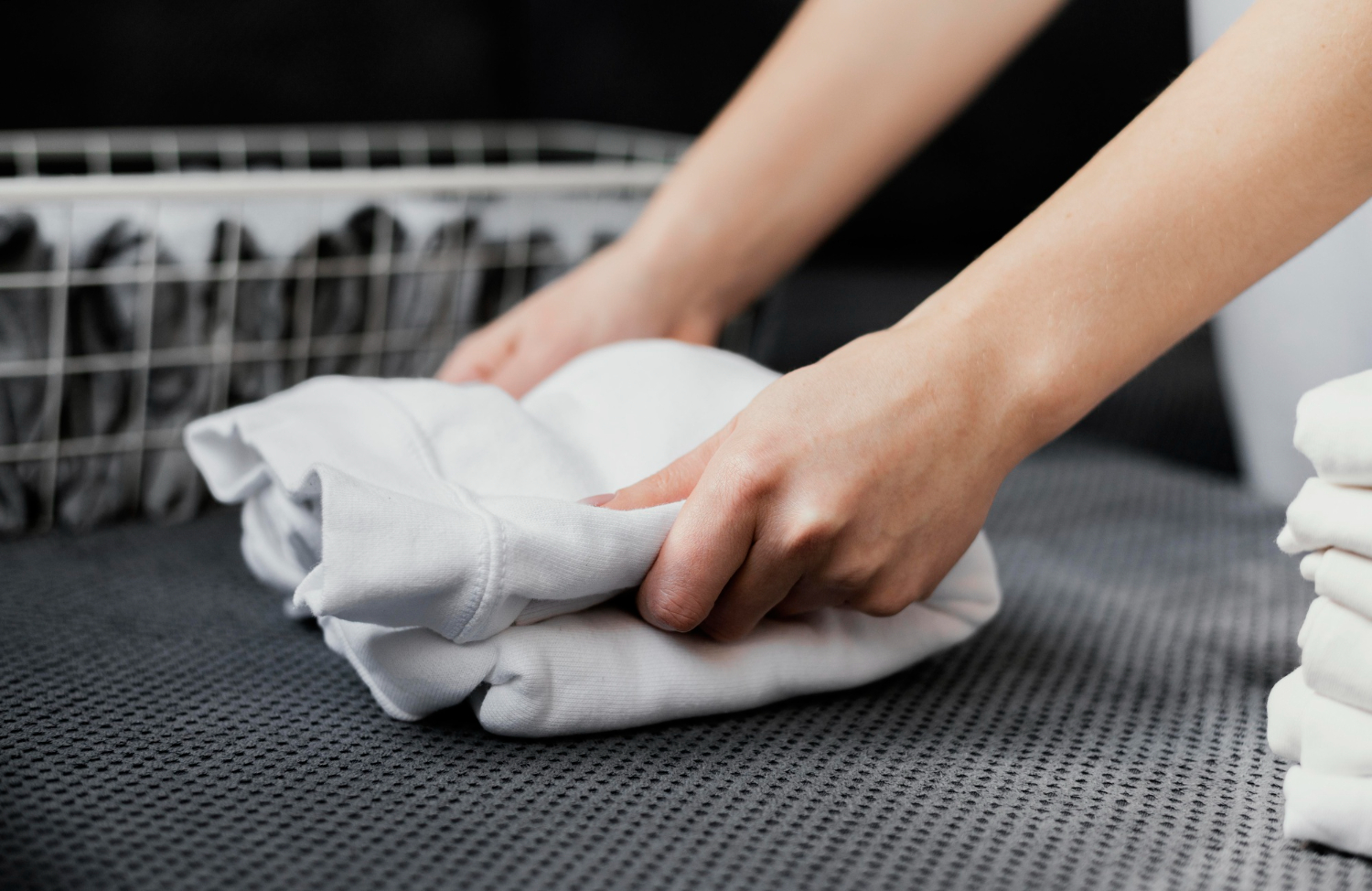
Meaning of Dreams About Clothes Floating in the River According to Javanese Primbon: Complete Meaning and Interpretation
Dreams are subconscious experiences that are often confusing yet intriguing to delve into their meanings. One unique dream is dreaming of seeing clothes floating in the river. In Javanese tradition, such dreams have specific interpretations believed to provide certain clues or messages for the dreamer. Let’s explore deeper about the meaning of dreams of clothes floating in the river according to Javanese primbon along with various related aspects.
1. Understanding the Dream of Clothes Floating in the River

Clothes (credit: freepik.com)
A dream of clothes floating in the river is a sleep experience where someone sees or feels their clothing being carried away by the river's current. In this dream, the clothes, which are personal items closely associated with a person, appear to be uncontrollable as they follow the flow of the river. This dream experience can be very vivid and evoke various feelings such as anxiety, confusion, or even despair when witnessing the clothes drifting away.
Some common variations of dreams related to clothes floating in the river include:
- Seeing one's own clothes floating in the river without being able to save them
- Trying to chase and retrieve the floating clothes but failing
- Clothes floating and then sinking, disappearing at the riverbed
- Clothes floating but eventually getting caught on the riverbank
- Seeing someone else's clothes floating in the river
Although it may seem simple, this dream is rich in symbolism and deeper meaning according to Javanese primbon. Clothes symbolize identity, self-esteem, and things that are attached to a person. Meanwhile, the river with its flowing current symbolizes the journey of life along with various obstacles and uncertainties. The combination of these two elements in a dream is believed to carry a special message that needs to be reflected upon.
2. Interpretation of Dreams About Clothes Floating in the River According to Javanese Primbon
In Javanese primbon, dreaming of clothes floating in a river has several main interpretations that need to be understood:
1.Loss or Change of Identity
Clothes that float symbolize the identity or personality of the dreamer who is experiencing turmoil or change. This can indicate a crisis of identity, confusion about self, or being in a transitional phase in life. Primbon interprets this as a sign that the dreamer needs to introspect and rediscover their true essence.
2.Letting Go of Past Burdens
Clothes that are carried away by the river can also be interpreted as the process of letting go of burdens, traumas, or negative experiences from the past. The river's current symbolizes the passage of time, carrying away things that are no longer relevant. This is a positive sign that the dreamer is in the process of healing and self-renewal.
3. Loss of Control over Life
The inability to save the drifting clothes reflects a feeling of losing control over life situations. The dreamer may be facing problems or challenges that feel beyond their ability to handle. Primbon suggests being more patient and trusting in the process of life.
4. Change of Fate or Fortune
The clothes that drift but then get caught or can be saved symbolize an unexpected change of fate. Although it initially seems bad, there is a possibility that good things will come in the end. This indicates the need to remain optimistic even when facing difficulties.
5. Warning of Upcoming Trials
In some interpretations, this dream can also be a sign of upcoming trials or problems in the near future. Drifting clothes symbolize the loss of protection, so the dreamer needs to be more vigilant and prepare to face challenges.
It is important to remember that the interpretation of this dream is not absolute and needs to be adjusted to the context of each individual's life. Javanese Primbon emphasizes the importance of introspection and deep contemplation to understand the messages behind each dream.
3. Symbolism and Deep Meaning
To understand more about the meaning of a dream of clothes floating in a river, we need to delve into the symbolism of the main elements in that dream:
Symbolism of Clothes
In the context of dreams and Javanese primbon interpretation, clothes have several symbolic meanings:
- Identity and personality: Clothes symbolize how we present ourselves to the outside world.
- Protection: Clothes provide a sense of safety and cover our vulnerabilities.
- Social status: The type and quality of clothes can reflect a person's position.
- Self-esteem: Clean and neat clothes symbolize self-respect.
- Role in society: Uniforms, for example, indicate a specific role or profession.
Symbolism of Rivers
Rivers in dreams and Javanese primbon are often interpreted as:
- Life journey: The flow of the river symbolizes the passage of time and life phases.
- Emotions: River water reflects a person's emotional state.
- Obstacles: Strong currents symbolize challenges that must be faced.
- Change: The nature of flowing water indicates inevitable changes.
- Purification: River water can also signify spiritual cleansing.
Deeper Meaning
By understanding the above symbolism, we can draw several deeper meanings from the dream of clothes floating in a river:
- The need to let go of ego and false self-image to find true identity.
- The importance of adapting to change and not being too attached to an old identity.
- A reminder not to rely too much on external factors in defining oneself.
- A call to flow more in living life and not to be too rigid.
- A reflection on how we manage emotions and face life's challenges.
These meanings certainly need to be further reflected upon according to the conditions and personal experiences of each dreamer. Javanese primbon emphasizes that a deep understanding of oneself is key to interpreting spiritual messages in dreams.
4. Causes of Dreams About Clothes Floating in the River

River (credit: freepik.com)
Although dreams are often considered to have spiritual or symbolic meanings, there are several psychological and physiological factors that can trigger dreams about clothes floating in a river:
Psychological Factors
- Anxiety about uncontrollable life changes
- Feelings of insecurity or vulnerability in certain situations
- Fear of losing identity or social roles
- Stress from work demands or personal relationships
- Unresolved past trauma
- Internal conflict between the desire to change and the fear of letting go of the old
Physiological Factors
- Dehydration before sleep that triggers dreams about water
- Room temperature that is too hot, leading to dreams of wet situations
- Sleep disorders such as sleep apnea that affect dream quality
- Side effects from certain medications
- Consumption of alcohol or certain substances before sleep
Environmental Factors
- Watching movies or reading stories with similar themes before sleep
- Recent real-life experiences of losing valuable items
- Living near a river or frequently seeing river scenery
- Rainy weather or flooding around the residence
Understanding these triggering factors can help in interpreting dreams more comprehensively. However, the Javanese primbon approach still emphasizes that regardless of the physical causes, every dream has a spiritual message that needs to be contemplated.
5. Tips for Responding to Dreams About Clothes Floating in the River
After experiencing a dream of clothes floating in a river, there are several steps that can be taken to respond to and understand its meaning more deeply:
1. Self-Introspection
Reflect on your current life conditions, especially related to your identity and social role. Are there aspects of yourself that feel 'adrift' or out of control? Identify areas that need attention or improvement.
2. Record Dream Details
As soon as you wake up, write down as many details of the dream as possible. Pay attention to the color of the clothes, the condition of the river, the feelings that arose, and other elements that may be significant. This will help in further analysis.
3. Reflect on the Symbolism
Think about the personal meaning of the clothes and the river in the context of your life. Is there a connection with the situations or worries you are currently facing?
4. Discuss with Trusted People
Sharing your dream experience with someone you trust can provide a new perspective. However, remain critical when accepting interpretations from others.
5. Consult with an Expert in Primbon
If you feel the need, you can consult with a Javanese primbon expert for a deeper interpretation. Make sure to choose a trustworthy and experienced expert.
6. Perform a Self-Cleansing Ritual
In Javanese tradition, it is often recommended to perform a self-cleansing ritual after a dream that is considered a sign. This can be a bath with flower water or a brief fast.
7.Take Positive Action
If the dream is interpreted as a warning, take concrete steps to improve aspects of life that need attention. This can include increasing awareness, improving relationships, or reordering life priorities.
8.Practice Meditation or Prayer
Taking time for meditation or prayer can help calm the mind and open oneself to deeper spiritual insights.
9.Don't Be Too Anxious
While it's important to reflect on the meaning of dreams, don't become too anxious or obsessed. Remember that dream interpretation is subjective and not always literal.
10.Learn from Experience
Use this dream as an opportunity to learn more about yourself and enhance your overall quality of life.
By applying the tips above, it is hoped that you can respond to the dream of clothes drifting in the river more wisely and gain positive benefits from the experience.
6. Benefits of Understanding Dream Meanings
Understanding the meaning of dreams, especially dreams of clothes floating in a river according to Javanese primbon, can provide various benefits for a person's life:
1.Deeper Self-Awareness
Analyzing dreams helps us recognize hidden aspects of our personality, desires, and fears that may not be conscious when awake. This can be a powerful tool for introspection.
2.Early Warning
Some dreams are believed to be forms of subconscious warnings about potential problems or dangers. Understanding this can help us be better prepared to face challenges.
3.Creative Problem Solving
Often, dreams present solutions or new perspectives to problems we are facing in symbolic forms. Interpreting dreams can pave the way for creative problem-solving.
4. Enhancement of Spiritual Awareness
For many people, dreams are seen as a bridge between the conscious and the spiritual realm. Understanding dreams can enhance spiritual connection and awareness of deeper dimensions of life.
5.Better Stress Management
By understanding messages from the subconscious through dreams, we can better manage stress and anxiety in our daily lives.
6.Intuition Development
Regular practice of dream interpretation can sharpen intuition, helping us become more sensitive to subtle signals in everyday life.
7.Increased Creativity
Dreams are often filled with unique images and ideas. Understanding and exploring dreams can be an unlimited source of creative inspiration.
8.Richer Cultural Understanding
Studying dream interpretation according to Javanese primbon opens insights into the richness of culture and the life philosophy of the Javanese people.
9. Self-Therapy Tools
In some psychotherapy approaches, dream analysis is used as a tool to help patients understand and address psychological issues.
10.Improving Sleep Quality
By understanding and addressing the messages from dreams, often the quality of sleep can improve due to reduced anxiety or unresolved issues.
However, it is important to remember that these benefits can be optimal if dream interpretation is done wisely, not too literally, and balanced with rational thinking and real actions in daily life.
7. Tradition of Dream Interpretation in Javanese Culture

Clothes (credit: freepik.com)
Dream interpretation holds a special place in Javanese culture. This tradition has lasted for centuries and is still preserved to this day. Here are some important aspects of the dream interpretation tradition in Javanese culture:
1.Primbon as the Main Guide
Primbon, a collection of traditional Javanese knowledge, serves as the main reference for interpreting dreams. Primbon books contain various dream interpretations that have been passed down through generations.
2.The Role of Dukun and Elders
In traditional Javanese society, dukun or village elders are often consulted for dream interpretation. They are considered to have special abilities in understanding mystical messages.
3. Relationship with Ancestors
Dreams are often considered a means of communication with ancestors or protective spirits. Some dreams are believed to be messages or guidance from the spiritual world.
4.Post-Dream Ritual
After experiencing a dream that is considered important, special rituals such as offerings or giving offerings are often performed to respond to the dream's message.
5.Javanese Calendar and Dreams
Dream interpretation is often associated with the Javanese calendar system. The day, market day, and wuku when the dream occurs are believed to influence its meaning.
6.Symbolism in Interpretation
Javanese culture is rich in symbolism, which is also reflected in dream interpretation. Each element in a dream can have complex symbolic meanings.
7. The Influence of Islam in Dream Interpretation
With the arrival of Islam in Java, there was an acculturation in dream interpretation, where Islamic elements were integrated with local traditions.
8.Dreams as Indicators of the Future
In Javanese belief, dreams are often considered omens or predictions about future events.
9.Differences in Interpretation Based on Gender
Some dreams have different interpretations depending on whether the dreamer is male or female.
10.Evolution of Dream Interpretation
Over time, dream interpretation in Javanese culture has also evolved, adapting to changing times and the influence of modernity.
The tradition of dream interpretation in Javanese culture reflects the spiritual and philosophical richness of the Javanese people. Although in this modern era many people are starting to abandon traditional beliefs, knowledge about dream interpretation is still considered a valuable cultural heritage and remains interesting to study.
8. Comparison with Other Dream Interpretations
To gain a more comprehensive understanding, let’s compare the interpretation of the dream of clothes floating in a river according to Javanese primbon with several other perspectives:
1.Psychological Interpretation (Freudian)
According to Freud's psychoanalytic theory, the dream of clothes floating in a river might be interpreted as:
- Anxiety about losing control over sexual or emotional aspects of oneself
- A feeling of insecurity in personal relationships
- A fear of changes in self-image or social roles
2.Islamic Spiritual Interpretation
From an Islamic perspective, this dream could be interpreted as:
- A warning to better guard one's modesty and dignity
- A sign of the need to repent and cleanse oneself from sins
- A signal of upcoming tests in terms of sustenance or worldly life
3.New Age Interpretation
Modern spiritual movements might interpret this dream as:
- A process of releasing negative energy and spiritual transformation
- A call to be more fluid in living life
- A sign that the dreamer needs to pay more attention to their emotional aspects
4.Chinese Cultural Interpretation
In Chinese tradition, this dream could be interpreted as:
- A sign of unexpected good fortune coming
- A warning of the presence of ill-intentioned people nearby
- A symbol of the need to maintain balance between yin and yang in life
5.Jungian Interpretation
Based on Carl Jung's theory, this dream might be seen as:
- A process of individuation where the ego sheds an irrelevant persona (social mask)
- Symbolization of the archetype "self" that is undergoing transformation
- A message from the subconscious about the need to integrate separated aspects of personality
Similarities and Differences
Although there are specific differences, some common themes that emerge across various interpretations include:
- The idea of change and self-transformation
- The concept of letting go of something old or no longer useful
- The importance of introspection and deeper self-understanding
The main differences lie in the cultural and philosophical contexts underlying each interpretation. Javanese primbon, for example, emphasizes spiritual aspects and connection with nature, while psychological interpretations focus more on the internal dynamics of the individual's psyche.
Understanding these various perspectives can enrich our understanding of dreams and open new insights into interpreting our subconscious experiences.
9. FAQ About Dreams of Clothes Floating in the River
Here are some frequently asked questions related to the dream of clothes floating in a river along with their answers:
1.Is dreaming of clothes floating in a river always a bad omen?
Not always. Although often considered a sign of loss or change, this dream can also be interpreted as a process of self-cleansing or letting go of things that are no longer needed in life.
2.What if in my dream I managed to save the floating clothes?
A dream in which you successfully save the floating clothes can be interpreted as your ability to overcome crises or to maintain important aspects of yourself despite facing significant challenges.
3.Does the color of the clothes in the dream affect its meaning?
Yes, the color of the clothes can influence the interpretation. For example, white clothes floating may symbolize the loss of purity or innocence, while black clothes could mean releasing negative energy.
4.What if the clothes floating belong to someone else?
A dream of seeing someone else's clothes floating may indicate your concern for that person or feelings of helplessness in assisting someone who is in trouble.
5. Is the condition of the river in the dream important to pay attention to?
Very important. A clear and calm river may have a different meaning than a murky and fast-flowing river. The condition of the river can symbolize your current emotional situation or environment.
6. How often should this dream be interpreted?
There are no definite rules. However, if this dream recurs or happens within a close time frame, there may be an important message that you need to pay more serious attention to.
7. Are there any special rituals to perform after this dream?
In Javanese tradition, some people may suggest performing self-cleaning rituals such as flower baths or fasting. However, the most important thing is to engage in introspection and take lessons from the dream.
8. What if I don't remember the details of the dream clearly?
If you only remember vaguely, focus on the feelings that arise when waking up from the dream. The emotions you felt can be important clues in interpreting the meaning of the dream.
9. Can this dream predict the future?
Although some traditions believe dreams to be a form of prophecy, it is better to view dreams as a reflection of the current inner condition rather than a literal prediction about the future.
10. How to distinguish between a regular dream and a dream that needs to be interpreted?
Intense, recurring dreams, or those that leave a deep impression upon waking are usually considered more significant and worthy of reflection or further interpretation.
10. Impact of Dreams About Clothes Floating in the River on Daily Life

River (credit: freepik.com)
A dream of clothes floating in a river, like other significant dreams, can have a quite substantial impact on the dreamer's daily life. Here are some ways how this dream can affect various aspects of life:
1. Change in Life Perspective
After experiencing this dream, one might start to question the aspects of life that have been considered important. Dreams can serve as a catalyst for reevaluating priorities and values held. For instance, someone who previously placed great importance on appearance and social status may begin to realize that there are other, more essential things in life.
2. Increased Self-Awareness
A dream of clothes floating in a river often encourages someone to be more introspective. This can lead to an increase in self-awareness, where one begins to better understand their motivations, fears, and deepest desires. This process can be very beneficial for personal development and internal problem-solving that may have gone unnoticed until now.
3.Changes in Interpersonal Relationships
If the dream is interpreted as a symbol of shedding the "mask" or social persona, it could affect how a person interacts with others. There may be a tendency to become more authentic in relationships, reducing behaviors that are solely aimed at pleasing others, or even ending relationships that are perceived as unhealthy.
4.Impact on Career Decisions
For some individuals, this dream could serve as a prompt to reevaluate their career paths. If the clothing in the dream is seen as a symbol of professional identity, seeing it drift away may raise questions about whether the current job or career truly aligns with their passions and personal values.
5.Lifestyle Changes
A dream of clothing drifting in a river can inspire significant lifestyle changes. This may include decisions to live more simply, reduce reliance on material possessions, or seek more meaningful experiences rather than the accumulation of belongings.
11. How to Apply Lessons from Dreams in Real Life
After understanding the meaning and potential impact of the dream about clothes floating in the river, the next step is how to apply the lessons or insights from that dream in daily life. Here are some practical ways to do this:
1. Deep Reflection
Take time for deep reflection on the message that the dream may want to convey. Ask yourself: Which aspects of life may need to be "let go" or changed? Are there fears or anxieties that need to be faced? This reflection process can be done through meditation, journaling, or discussions with trusted individuals.
2. Identify Areas for Change
Based on the results of your reflection, identify specific areas in your life that may require change or improvement. This could include mindset, habits, relationships, or career aspects. Make a concrete list of things you want to change or improve.
3. Set Goals and Action Plans
After identifying areas for change, set clear and realistic goals. For example, if the dream is interpreted as a need to let go of past burdens, the goal might be "To forgive myself and others for past mistakes." Then, create a step-by-step action plan to achieve that goal.
4. Practice Mindfulness
Implement mindfulness practices in daily life to become more aware of your thoughts, feelings, and actions. This will help you be more responsive to situations rather than reactive, in line with the "flowing" message often associated with river symbolism in dreams.
5. Periodic Evaluation and Adjustment
Periodically evaluate your progress in applying the lessons from the dream. Do the changes made have a positive impact? Are there any challenges that arise? Adjust your plans and actions based on the results of this evaluation.
12. Myths and Facts About Dreams of Clothes Floating in the River
With the popularity of dream interpretation, various myths surrounding dreams of clothes floating in a river have emerged. It is important to distinguish between myths and facts to avoid getting caught up in incorrect interpretations or unfounded superstitions. Here are some common myths along with the facts:
Myth 1: Dreams of Clothes Floating Always Mean Bad Luck
Fact: Not necessarily. Although often interpreted negatively, this dream can also symbolize self-cleansing or letting go of things that are no longer needed in life. Its interpretation highly depends on the personal and cultural context of the dreamer.
Myth 2: You Must Perform a Special Ritual After This Dream
Fact: While some traditions suggest certain rituals, there is no absolute requirement to do so. What is more important is personal reflection and concrete actions to improve aspects of life that are felt to need improvement.
Myth 3: This Dream Is a Certain Prediction About the Future
Fact: Dreams are better viewed as reflections of the current inner condition rather than literal predictions about the future. Dreams can provide insights but do not definitively determine what will happen.
Myth 4: Only Experts Can Interpret This Dream
Fact: While expert opinions can help, everyone can actually interpret their own dreams by engaging in deep reflection and understanding the personal context of the dream.
Myth 5: The Same Dream Must Have the Same Meaning for Everyone
Fact: Dream interpretation is highly personal and contextual. The same dream can have different meanings for different people, depending on their life situations and cultural backgrounds.
13. The Influence of Modern Culture on Dream Interpretation

Clothes (credit: freepik.com)
The development of technology and changes in lifestyle in the modern era have had a significant impact on how we view and interpret dreams, including dreams of clothes floating in a river. Here are some aspects of the influence of modern culture on dream interpretation:
1. Broader Access to Information
The internet and social media have opened up vast access to various dream interpretations from different cultures and perspectives. This allows people to compare and choose interpretations that are most relevant to their personal context. However, this can also lead to confusion due to the abundance of information that can sometimes contradict each other.
2. Scientific Approach to Dream Interpretation
The development of psychology and neuroscience has brought a more scientific approach to understanding dreams. Dreams are no longer seen merely as mystical messages, but also as cognitive processes that can be explained scientifically. This brings a new dimension to the way people interpret their dream experiences.
3.Shifts in Values and Priorities
Changes in lifestyle and social values in the modern era also influence how people interpret symbols in dreams. For example, clothing that may have once been interpreted primarily as a symbol of social status can now also be interpreted as an expression of individuality or even environmental issues (in the context of fast fashion).
4.Technology and Dreams
The presence of technology in daily life is also starting to appear in dream content. For instance, someone might dream of virtual clothing floating in a digital river. This brings a new dimension to dream interpretation that needs to be adjusted to the realities of modern technology.
5.Globalization and Cultural Mixing
Globalization has led to a blending of various traditions and beliefs. As a result, dream interpretation has also become more eclectic, combining elements from various cultures and philosophies.
14. The Role of Dreams in Personal Development
Dreams, including dreams of clothes floating in a river, can play an important role in the process of self-development. Here are some ways in which dreams can contribute to personal growth:
1.As a Mirror of the Subconscious
Dreams are often considered a window into the subconscious. By understanding the symbols and messages within dreams, one can gain insights into aspects of themselves that may be unnoticed in a waking state. This can be an important first step in the self-development process.
2.A Tool for Problem Solving
Sometimes, dreams can present solutions or new perspectives on problems being faced. Our brains continue to work even while we sleep, and dreams can be a way for the brain to "process" information and seek solutions creatively.
3. A Catalyst for Change
Memorable dreams, such as dreams of clothes floating in a river, often serve as triggers for introspection and change. Intense dream experiences can encourage someone to evaluate their life and make positive changes.
4.Enhancing Emotional Awareness
Dreams often involve intense emotions. By analyzing these emotions, one can enhance their emotional awareness, which is an important component of emotional intelligence and self-development.
5.A Means of Creative Exploration
Dreams can be an unlimited source of creative inspiration. Many artists, writers, and innovators have derived brilliant ideas from their dreams. Exploring and developing ideas from dreams can be an effective way to boost creativity.
15. The Relationship Between Dreams and Mental Health
Dreams, including dreams of clothes floating in a river, are closely related to mental health. Understanding this relationship can help in recognizing and addressing various psychological issues. Here are some important aspects of the relationship between dreams and mental health:
1. Dreams as Indicators of Stress
Intense or disturbing dreams, such as recurring dreams of clothes floating, can be indicators of high stress levels. People experiencing excessive stress often report more vivid and disturbing dreams. Understanding these dreams can help in identifying the sources of stress and finding ways to cope with it.
2. The Role of Dreams in Processing Trauma
For individuals who have experienced trauma, dreams often serve as a way for the brain to process and attempt to cope with traumatic experiences. Recurring dreams about traumatic events or related symbols (such as floating clothes possibly symbolizing a loss of security) can be part of the psychological healing process.
3. Dreams and Anxiety Disorders
People with anxiety disorders often report dreams that reflect their worries. For example, dreams of floating clothes may be more frequently experienced by someone who is anxious about losing control or identity. Understanding these dream patterns can assist in the diagnosis and treatment of anxiety disorders.
4. The Relationship Between Dreams and Depression
Research shows that the dream patterns of people experiencing depression often differ from those who are not depressed. More negative or distressing dreams, such as constantly losing something (e.g., floating clothes), can be an indication of depressive symptoms.
5. Dreams as a Therapeutic Tool
In some psychotherapy approaches, dream analysis is used as a tool to help patients understand and address psychological issues. Therapy that involves dream exploration can help individuals gain insights into internal conflicts and find creative solutions to their problems.
16. The Influence of Environment on Dream Content

River (credit: freepik.com)
The environment in which a person lives and operates has a significant influence on the content of the dreams experienced, including dreams like clothes floating in a river. Understanding the relationship between the environment and dreams can provide deep insights into how daily experiences shape our subconscious. Here are some important aspects of the environmental influence on dream content:
1.Geographical Influence
The geographical location where a person resides can affect the elements that appear in dreams. For example, people living near rivers or the sea may dream more frequently about water, including dreams of clothes floating in a river. Conversely, those living in urban areas may dream more often about buildings or vehicles.
2.Impact of Weather and Climate
The weather and climate conditions around us can also influence dream content. For example, during the rainy season, dreams about water or floods may occur more frequently. This could explain why dreams of clothes being swept away in a river may be more common at certain times of the year.
3. Cultural and Social Influences
Cultural and social environments play a significant role in shaping the symbols and narratives that appear in dreams. For instance, in societies that place a high value on appearance, dreams about clothing may occur more often and carry more significant meanings.
4. Exposure to Media and Technology
In the digital age, the content we consume through media and technology can influence what appears in our dreams. For example, someone who frequently watches news about natural disasters may be more likely to dream about similar situations, such as floods or clothes being swept away.
5. Work Environment and Stress
Conditions and pressures at the workplace are often reflected in dreams. Someone who works in a highly competitive environment may more frequently dream about loss or failure, which can manifest in the form of dreams such as clothes drifting in a river.
17. Conclusion
The dream of clothes drifting in a river, as we have explored in depth, has complex meanings and significance in the context of Javanese primbon and various other perspectives. This dream experience not only reflects the psychological and spiritual condition of the dreamer but can also serve as a catalyst for introspection and positive change in life.
It is important to remember that dream interpretation is highly personal and contextual. While Javanese primbon and various other traditions offer general guidance, the true meaning of this dream will greatly depend on the experiences, background, and life situations of each individual. Therefore, a wise approach is to view this dream as a tool for deeper self-understanding, rather than as a prophecy or rigid rule.
In applying insights from this dream to daily life, we are encouraged to be more reflective and aware of the changes that may be necessary. Whether in terms of self-identity, relationships with others, or how we face life's challenges, the dream of clothes drifting in a river can serve as a reminder of the importance of flexibility and the ability to "flow" in the face of change, while still maintaining the most essential essence of oneself.
Finally, understanding this dream also invites us to appreciate the richness of culture and local wisdom, as reflected in Javanese primbon. While remaining open to modern and scientific perspectives, we can draw wisdom from these ancient traditions to enrich our understanding of ourselves and the world around us.
Thus, the dream of clothes drifting in a river is not just a fleeting sleep experience, but can be a valuable mirror for reflecting on our life journey, encouraging personal growth, and deepening our connection with ourselves and our surroundings.
(kpl/dhm)
Disclaimer: This translation from Bahasa Indonesia to English has been generated by Artificial Intelligence.



















